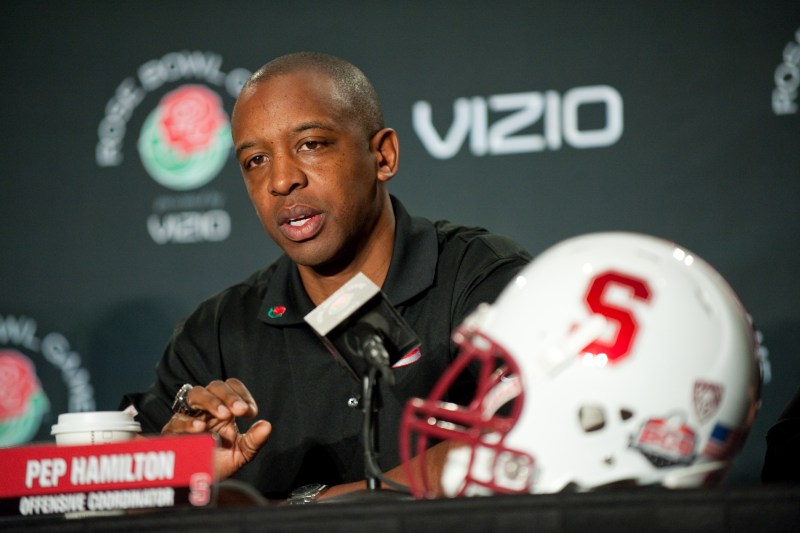There was a point in mid-October when Stanford’s goal of claiming the Pac-12 crown seemed a world away. The Cardinal was coming off a tough overtime loss to Notre Dame, a result that was decided by one of the most controversial calls in college football this season.
“I remember the disappointment on the plane ride home on Monday,” said senior wideout Drew Terrell. “I don’t know how we lost that game. But we let it slip away. We couldn’t survive our mistakes.”
The Fighting Irish had handed the Cardinal its second loss of the year and the once-vivid memory of its upset over USC back in late September was fading fast in the rearview mirror. With a host of ranked opponents still left on the grueling back end of its schedule, the outlook on Stanford’s postseason fate at the midpoint of the season was far less sunny than Pasadena.
The team was at a crossroads. The Pac-12 title was certainly still attainable, but the room for error for the rest of the way was little to none. Stanford could also have easily lost three of its six remaining games, which included showdowns against perennial powerhouse Oregon and up-and-coming Oregon State and UCLA.
To make matters worse, the players struggled to follow the 24-hour rule after the loss. Head coach David Shaw wasn’t happy at all with the quality of Tuesday’s practice during Big Game week.
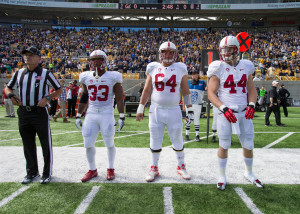
That’s when the three team captains — Chase Thomas, Sam Schwartzstein and Stepfan Taylor — took matters into their own hands.
“I remember the captains came into the locker room and they got us all together,” said quarterback Kevin Hogan. “This was the first time it’s happened since I’ve been there, where the captains have called the team together. They just told us that we’re a very talented team, we can either lay down and let the season go, go .500 for the rest of the season, or we can come together as a team and fight.”
“I think that’s what we did. It hit us all very hard. Watching our leaders — the people who we came into Stanford idolizing — making our game after, it really helped our team as a whole.”
The message must have hit home because the practice on the following day was one of the best practices of the season, according to Schwartzstein.
“It was our second loss of the season, and a lot of us remember going down to that Sun Bowl in El Paso our freshman year,” Terrell said. “And we vowed to ourselves that we didn’t want to go back to that. We had accustomed to this BCS lifestyle, if you will.”
Seven wins and one conference title later, the Cardinal finds itself in Pasadena, preparing to play in the Rose Bowl for the first time in over a decade.
***
Much of the pregame focus has been on the highly anticipated showdown between Wisconsin’s Montee Ball-led offense and Stanford’s vaunted front seven. But the upcoming battle between the Cardinal’s smashmouth offense and the Badgers’ stingy defense also provides an intriguing matchup.
The Badgers come into the game ranked in the nation’s top 20 in multiple defensive categories, including points (19.1 per game), total yards (320.9 per game) and rushing yards (33.6). Stanford offensive coordinator Pep Hamilton faces a tall order in unlocking a defense that did not give up more than three touchdowns in any regular-season game.
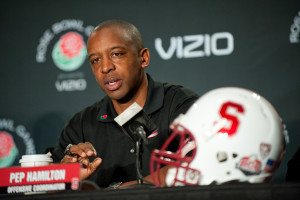
“[Wisconsin’s defense] is a lot like our defense,” Hamilton commented. “They’re tough. They’re physical. They take the bend-but-don’t-break approach…You’re not going to catch guys out of position a whole bunch. They really force you to be patient with the play calling, and execute methodically getting the ball down the field, which is what we like to do.”
Hamilton cited parallels between Wisconsin’s defense and Washington’s defense, units that don’t blitz often but feature big, physical defensive linemen who can stop the run and maintain gap integrity without added pressure from the linebackers. The Cardinal failed to score an offensive touchdown against the Huskies, albeit the game was early in the season when the offense was struggling to find its rhythm.
Even through the drive-killing inconsistencies that have plagued Stanford’s offense at times this season, there is one player who has carried the team on his shoulder the entire way: running back Stepfan Taylor. In his last game in cardinal and white, Stanford’s all-time rushing leader looks to reinforce his place next to the likes of Darrin Nelson and Toby Gerhart in the pantheon of Cardinal running back greats.
“Stepfan is really the model of consistency for us,” Hamilton said. “The one attribute that I think is really taken for granted when you look at good running backs is their ability to play without the ball. We can leave Stepfan on the field at all times — first, second and third down. He’s not a situational player.”
So why didn’t Andrew Luck win the Heisman Trophy, again?
“We’re a run-first team,” said Hamilton. “I feel like and I think about it all the time that I probably cost Andrew Luck the Heisman when it’s all said and done.”
***
No moment has been too big for quarterback Kevin Hogan, whose 72.9 completion percentage and running abilities are major reasons why the Cardinal is in Pasadena (and not El Paso) right now. The poise that he has shown in leading Stanford to four consecutive wins over ranked opponents has inevitably led to comparisons with Luck. Even his own teammates have found themselves talking about the similarities.
“The fourth-quarter drives remind me a lot of [Andrew],” Schwartzstein commented. “I know Andrew was more of a physical presence. We knew we had the best player in the country on our team…But when you see Kevin’s eyes and you see the fire in Kevin’s eyes, that’s kind of what gets you going. We understand that we’re definitely going to win this game the way this kid looks right now.”
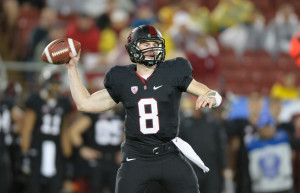
But the redshirt freshman, who earned All-Pac-12 honorable mentions despite starting in only four games, humbly brushed those compliments aside.
“We’re different players,” Hogan said. “He’s an amazing player. I try to be like him. He’s like an idol. But I wouldn’t want to be compared to him. I think that does him an injustice.”
Given Hogan’s rapidly growing success, some people have wondered why he wasn’t given the starting role under center to begin the season. It certainly wasn’t because he lacked the physical talents.
“I think my knowledge of the playbook probably held me back,” Hogan said. “The coaches knew I wasn’t ready. I wasn’t ready to go in at the time. Just throughout the season, studying it more and more, knowing I really needed to focus on that really helped.”
Among all of the starting players on the Stanford team, Hogan might have benefited the most from the extra month of preparation in terms of expanding his control of the offense even further.
“To play quarterback in the Pac-12 and with a team of this magnitude, it’s incredibly difficult,” Terrell said. “You don’t realize how much pressure and mental side of things can affect someone. And [Hogan] has done an incredible job with that…The game comes to him. He’s able to make plays. On game day, he does everything right.”
***
With most starters on both sides of the ball returning next year, it’s not a stretch to say that the Cardinal will be in the hunt for the national championship in the upcoming season.
The return of consensus All-American tight end Zach Ertz would further bolster Stanford’s bid for a 2013-4 national title, but the redshirt junior probably won’t be making the big decision until at least a week after the Rose Bowl.
“I’ll probably talk to coach Shaw a few days after the game,” Ertz said. “We haven’t spoken about what we want to do after. So we’ll talk maybe [Jan. 3] or something, and see if we want to have a face-to-face meeting. Then I’ll probably drive down to Stanford a few days after that and I’ll talk to coach Bloomgren and coach Hamliton to see what they have to say. Then I’ll get that input and talk to my family.”
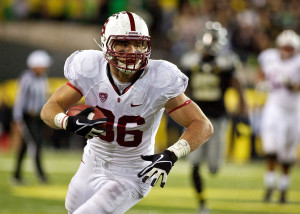
For now, Ertz is only concerned with preparing for Wisconsin. It starts with learning from the Pac-12 Championship Game, where Ertz and and his counterpart Levine Toilolo were uncharacteristically held to a combined four catches for 25 yards.
“[UCLA] double-teamed a lot and jut safety over the top the whole time, corner over the top,” Ertz said. “It was unique. But I think we’ve learned from that as players and a coaching staff. So we have answered for that now.”
The difficulty that defenses face when it comes to covering Ertz is well documented; his 6-6, 252-pound frame is too big for defensive backs and his top-end speed is too fast for linebackers. Ertz has done his share of delivering in clutch time, hauling in four game-winning touchdown receptions this season. But one of the more underrated skills that he possesses is his run-blocking.
“I like the block aspect a lot,” he said. “In this offense, you have to be a run blocker and the ability to play without the ball first to get on the field.”
Ertz played in both the Orange Bowl and the Fiesta Bowl the last couple seasons, but finally having the opportunity to play in The Granddaddy of Them All is a bit more special.
“The meaning of this game is a little different than the last two,” Ertz said. “Even though we were 10-1, whatever our records were last year, this is the one we play for. The Rose Bowl is the most important game because every season we set out we want to win the Pac-12 Championship. Even though we played in the BCS games, this one means a little more to us.”
***
Before settling matters on the football field, Stanford and Wisconsin first squared off at the dinner table. In what has become a Rose Bowl tradition, the two teams have an eating contest aptly named the Beef Bowl at Lawry’s Prime Rib restaurant in Beverly Hills.
Wisconsin, which beat both TCU and Oregon in the past two Beef Bowls, narrowly defeated Stanford 619 pounds to 602 pounds. Shaw imposed a two-slab restriction on most players, but allowed a few contenders to eat with abandon.
Freshman offensive lineman Joshua Garnett was one of the players who took advantage of the green light and led the way for the Cardinal, devouring a staggering seven slabs of 24-ounce prime rib. Garnett was ready for his eighth piece, but unfortunately had to curb his appetite when his team was about to leave without him.
“The Beef Bowl was such a great event,” Garnett said. “Of course the food was excellent. The cream of corn and the prime rib was delicious. We were having fun and I was talking a big game. Luckily, my stomach was able to back it up.”
What’s even more impressive is that the freshman found a way to survive practice the next day.
“I was scared this morning and unsure how practice would go,” he said. “But it really helped once I got the blood flowing. You have no choice but to go full speed at practice. Now that practices is over, I’m going to get some more food in me and have a few snacks tonight.”
